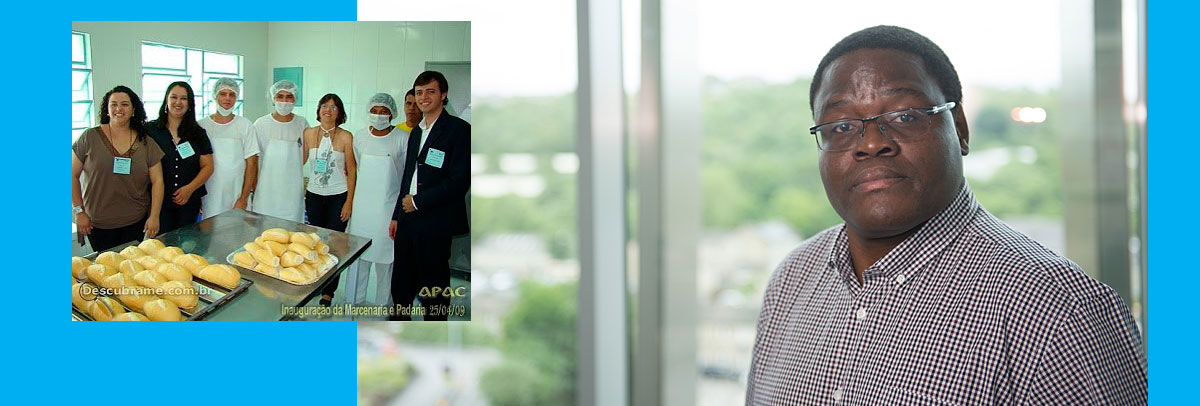 Brazilian APAC prisoners and Huddersfield researcher Dr Walter Mswaka
Brazilian APAC prisoners and Huddersfield researcher Dr Walter MswakaBenefits of Brazilian open prisoners undertaking in social enterprise activities is ignored by the judiciary despite being a cheaper and more effective deterrent than mainstream prison
THE open prison system in Brazil has generally been seen as too soft a punishment for criminals and as a result the Brazilian justice system scarcely uses them, even though financially open prisons are a less costly option than the mainstream prisons.
Now, a senior lecturer at the University of Huddersfield, is providing quantifiable evidence that demonstrates the benefits bestowed on criminals in open prisons and how them being involved in social enterprise can address a prisoner’s habitual relapse into crime.
Dr Walter Mswaka is a Senior Lecturer in Business Strategy in Huddersfield’s Business School. His research is in collaboration with Dr Armindo S. S. Teodósio, PhD researcher Vander L. Aguiar and Dr Maria Carmem S. Moreira from the Pontifical Catholic University of Minas Gerais (PUC Minas) and both universities recently signed a memorandum of understanding to underpin the work.
Together, they are raising awareness of the open prison system in Brazil, known as APACs (Association for the Protection and Assistance of the Condemned), and the benefits of allowing APAC prisoners to undertake in social enterprise activities.
Their research discovered that, even though the cost to run an APAC is two thirds less than a regular prison and to maintain an APAC inmate is only $250 per month compared to the $1,000 for a general prisoner, APACs are still not being used by the judiciary to their full potential.
Dr Mswaka explained that this is largely because the Brazilian justice system has always favoured a heavy-handed approach to crime.
“With more evidence coming to light however, there are some high-ranking judges and other criminal justice officials who are now seeing the benefits of the APACs and it is hoped that this will result in some form of paradigm shift in potential ways to reduce crime and recidivism,” said Dr Mswaka.
In the APACs, the prisoners are known as recuperandos – ‘the recovering ones’. Dr Mswaka and his team interviewed 200 recuperandos from one of Brazil’s most successful APACs in Santa Luzia. They discovered that the prisoners received ongoing enterprise support with major companies such as Fiat’s car factory, Brazil’s mining corporations and in the construction sector.
The team are confident that the findings from their research will lead to an increase in Brazilian judges and policymakers accepting the APAC prison system as a better alternative.
“At the moment, there is only anecdotal evidence about the benefits received by APAC prisoners taking part in social enterprise activities,” said Dr Mswaka. “While researchers and practitioners acknowledge that one of the key causes of recidivism is lack of employment skills and training, there is a lack of actual researched evidence on serving prisoners.”
More Stories
New MSc Security Science for Bahrain police
The opportunity to work with the Royal Academy of Policing was identified and developed by University’s Dr Mosttafa Alghadhi
Crime, Security and Society journal launched
Topics include terrorism, counter-terrorism, child sexual exploitation, burglary, policing, forensics and radicalisation
More women commit suicide in prison than men
Award-winning book sets out strategies to tackle the problem and calls for national approach to address the issues
